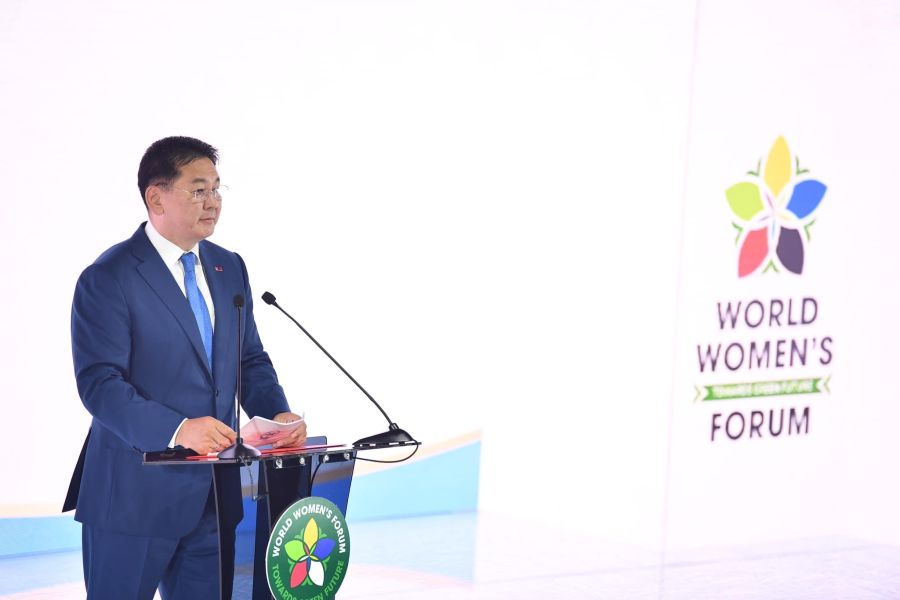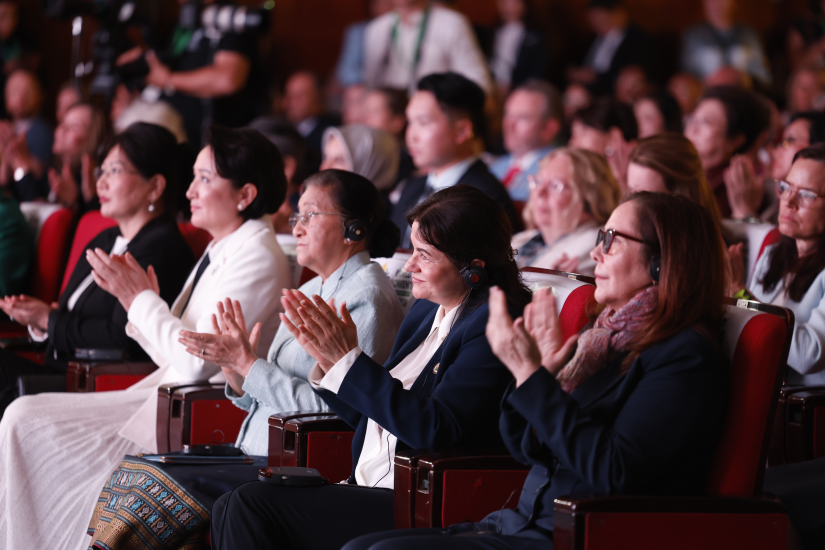Khurelsukh Ukhnaa: “Ulaanbaatar Declaration for a Sustainable Future” Will Bolster the Leadership, Participation and Role of Girls and Women

Ulaanbaatar, August 22, 2024 /MONTSAME/. Under the auspices of President of Mongolia Khurelsukh Ukhnaa, the World Women’s Forum commences in Ulaanbaatar, Mongolia, on August 22, 2024. The Forum, under the theme “Towards a Greener Future” is co-hosted by the Office of the President of Mongolia, the Ministry of Foreign Affairs of Mongolia, and the UN in Mongolia.
President of Mongolia Khurelsukh Ukhnaa opened the Forum. We present the opening speech of the President.
Distinguished guests and delegates,
Ladies and gentlemen,
I would like to express my sincere gratitude to all the women leaders from around the world who have joined us for the international women’s forum in our beautiful country, the Land of the Eternal Blue Sky, and wish you a good day.
Mongolia is organizing this World Women’s Forum ahead of the Summit of the Future to be held next September in New York, and amidst of the preparations towards the 30th anniversary of the Beijing Declaration and Programme of Action and the 25th anniversary of the Security Council Resolution on “Women, Peace, and Security”. I sincerely thank the co-organizers of this event, the United Nations and its system organizations, as well as all other organizations, their management, and staff who provided sincere support to us.
As women play an eminent role in peace, development and family well-being within any nation, the role and participation of women and women leaders are significant in maintaining the world peace and security, achieving the Sustainable Development Goals, and building a just and human society. Although we have already passed the halfway point in implementing the global Sustainable Development Goals, SDG 5—achieving gender equality and empowering all women and girls—has not yet been met. Despite certain advancements in gender equality in various countries around the world, international organizations warn that the implementation remains insufficient.
According to an IMF study, in many countries, legal regulations that restrict women’s economic participation still exist, and the low representation of women at decision-making levels persists compared to men. For instance, as of June this year, only 26 countries are led by women, and women represent 26.5 percent of Members of Parliament globally and 22 percent of Cabinet members heading ministries. Women are disproportionately represented in the informal sector and unpaid labor, and they are paid about 12 percent less than men. IMF research also highlighted the possibility of expanding the global economy by 23 percent if gender equality is fully achieved worldwide.
Distinguished guests and delegates,
As we, Mongolians, have revered the mother as a goddess since ancient times, historical records reveal that the wisdom, sensitivity, and kindness of women, including queens, have played a crucial role in state affairs and diplomatic relations between nations. Mongolia aims to further enrich its historical tradition, create conditions for equal participation of women in every sector nationally and at every level, and demonstrate leadership in the region.
Mongolia became the first country in Asia to recognize gender equality in its Constitution, adopted 100 years ago, which acknowledged women's political rights and guaranteed their right to vote and be elected. In this regard, it is my pleasure to note that this year marks the 100th anniversary of the establishment of the Mongolian Women's Union, the first non-governmental organization dedicated to protecting the rights of Mongolian women.
Mongolia's efforts to enhance opportunities for women to be elected to Parliament and improve the legal framework have resulted in 32 women winning seats in the recent elections, comprising 25 percent of the total MPs. This achievement positions Mongolia as one of the leading countries in Asia for women's representation in Parliament.
Mongolia has acceded to numerous international agreements, conventions, and actively supports initiatives focused on protecting the rights of girls and women and promoting gender equality. The country has also served as a member of the Commission on the Status of Women (CSW) under the United Nations Economic and Social Council (UN ECOSOC). Since 1997, Mongolia has been a key initiator of the biennial UN General Assembly resolution on the 'Improvement of the Situation of Women and Girls in Rural Areas.”
Over the past 20 years, Mongolia has actively participated in UN peacekeeping operations, deploying over 20,000 blue helmets and troops to hotspots around the world to promote international peace and security. Mongolia ranks in the top 18 of more than 120 troop-contributing countries in terms of the number of female peacekeepers. In the future, we will fully support UN Security Council Resolution 1325 on "Women, Peace, and Security" and UN Secretary-General António Guterres’ Action for Peacekeeping (A4P) initiative, and actively work to further increase the participation of women in maintaining international peace and security.
Distinguished guests and delegates,
Humankind is facing increasingly challenging times, characterized by rapid climate change, pandemics, wars, and armed conflicts. Humanity has lost over 7 million lives due to the COVID-19 pandemic. According to a report, over 120 million people have been forced to flee their homes and countries in the past 16 months due to climate change, natural disasters, geopolitical tensions, and conflicts. More specifically, a UN Environment study found that approximately 80 percent of those displaced by climate change are women and children. In addition, the World Meteorological Organization announced that last July was one of the two hottest months in the world.
In this way, challenges like global climate change, biodiversity loss, desertification, land degradation, water scarcity, drought. and floods demand an enormous effort and effective cooperation from all of humanity. The impacts of climate change are felt by everyone around the world, however, the degree of the impact of climate change greatly varies depending on age, gender. and other socio-economic factors. Girls and women, in particular, are more affected by the negative impacts of climate change. For example, the fact that girls and women work mainly in the food and agriculture sectors, which are more vulnerable to climate change, affects them more.
The UN Women report warns that if global climate change mitigation goals are not met, an estimated 160 million new girls and women could fall into poverty, and approximately 240 million girls and women could face food insecurity by 2050. Mongolia which has an extreme continental climate, is one of the countries which is the most affected by climate change. For instance, the average temperature in Mongolia has increased by 2.25 percent in the last 80 years, which is twice as high compared to the world average.
According to a study, climate change has caused the number of weather-related disasters to double over the past 20 years. These disasters negatively impact 8 percent of the country's population annually and result in economic losses equivalent to 0.6 percent of GDP. In this way, climate change, soil degradation, desertification, dust storms, droughts, Dzuds have a heavy impact on our Mongolians' traditional animal husbandry, thus becoming a major challenge for the preservation of the nomadic civilization. Thus, to achieve Sustainable Development Goals and mitigate the adverse effects of climate change, Mongolia has been implementing major nationwide initiatives such as the "Billion Trees," "Food Supply and Security," "Healthy Mongolian" and "White Gold" movements.
Additionally, Mongolia is gearing up to host the 17th Conference of the Parties to the United Nations Convention on Desertification in 2026. I am also pleased to announce that at the initiative of Mongolia, the UN General Assembly unanimously adopted a resolution proclaiming 2026 as the International Year of Rangelands and Pastoralists.
The report on the implementation of the Paris Agreement recommends enhancing coordination among the UN Framework Convention on Climate Change, the Convention on Biological Diversity, and the Convention on Combating Desertification. It also emphasizes the importance of ensuring gender equality in these efforts and increasing the participation and leadership of women. Specifically, improving the education and skills of girls and women is one of the main priorities for mitigating climate change.
Globally, while there has been some progress in enrolling girls in primary and secondary education and improving literacy rates, the United Nations Children's Fund reports a troubling statistic: 120 million girls worldwide are still denied their right to education. In my country, although women outnumber men at all educational levels, it is necessary to focus on enhancing their economic, social, and political participation and leadership.
It is highly commendable that the Pact for the Future, set to be adopted at the upcoming UN Summit of the Future, emphasizes the crucial issues of protecting women's rights, enhancing their leadership and political participation, and empowering them economically.
Distinguished guests and delegates,
Ladies and gentlemen,
The voice, participation, and leadership of girls and women are crucially important for tackling major challenges such as global peace, security, environmental issues, climate change, and food security. I am confident that the women leaders participating in this international forum, coming from around the world, will make significant contributions with your suggestions and initiatives.
As a country committed to a 'peaceful, open, and multi-pillar' foreign policy, Mongolia respects the unique history, culture, civilization, national interests, and development paths of each nation. We are dedicated to fostering international relations based on a multi-pillar approach. Therefore, my country believes that any difficulties and misunderstandings should be addressed through mutual understanding, trust, respect, and dialogue. It is my firm belief that today’s forum will make a certain contribution to this cause.
The 'Ulaanbaatar Declaration for a Sustainable Future' from the World Women's Forum will make a significant contribution to bolster the leadership, participation, and role of girls and women. I am also confident that this declaration will support the implementation of the commitments outlined in the Beijing Declaration and Programme of Action adopted in 1995 and will complement the forthcoming Summit of the Future in New York.
I wish you all women and women leaders great success in your endeavors to achieve the global peace, security, and sustainable development goals.
I wish you, dear women leaders visiting our beautiful country, the Land of the Eternal Blue Sky, health, happiness, and all the best.
I wish you all great success in your forum activities."








